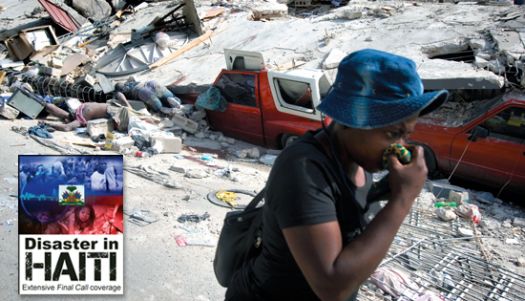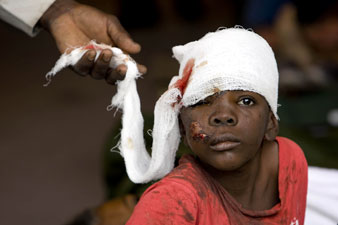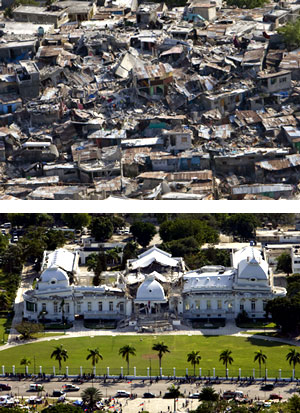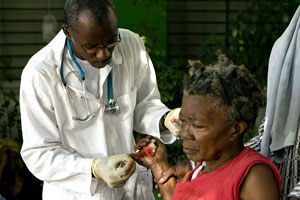FCNNEWSSOURCE

by Pharoh Martin and Kendra Desrosiers
NNPA National and Special Correspondent
Askia Muhammad -Final Call Senior Correspondent-
Brian Muhammad -Final Call Contributing Writer-
WASHINGTON (NNPA) – It’s been described as “the world’s Katrina.” The 7.0 magnitude earthquake that completely devastated and uprooted the nation of Haiti, leaving an estimated 200,000 dead and millions more homeless, injured and in despair. Government officials are predicting that the death toll could eventually rise to half a million, making it one of the most destructive natural disasters ever.

Already reeling from a string of recent national setbacks, including political upheavals and an overwhelming series of hurricanes in 2008, one of the poorest nations in the Western hemisphere now has to deal with this tragedy.
“Port-Au-Prince is destroyed. We have a lot death, a lot of casualties, human casualties, material casualties, we are dead,” said Cassandra Valbrun in a phone interview from Haiti. The 34-year-old married mother of two works in the Port-Au-Prince suburb of Pétionville. She was still at work when the earthquake struck Jan. 12.
“We need water, medication and tents because people are sleeping outside of their house,” she said. “We are sleeping on the street, on yards, on open fields and it’s cold at night. It’s like 21-Celsius degree. It’s cold. I’m sleeping in a neighbor’s back yard. We are surviving. We are on our own with food we’ve had at home. We’ve come together and we’ve tried to give some cereal to the kids. We adults eat once in the day to make the food last, so we don’t spoil it. And I don’t know how long we will keep doing that.”
Howard University international student Roberte Exantus is also from the Haitian suburb of Pétionville. The 20-year-old was in Washington, D.C. when the earthquake hit and while she was fortunate enough to hear from her parents she still has heard no news from other members of her family.
“My father, I recently heard from him, but my friends, my brother is still there. But I’m waiting, I’m hoping and waiting and praying,” she shared.
When Ms. Exantus spoke to her father by phone she said that he seemed to be in a delirious mental state. He just told her to stay strong.

“He was just saying the dead people are everywhere,” Ms. Exantus said. “Everyone is on their own right now. A lot talk about a lot of the help they are getting but, according to my dad, they are waiting. Nothing has gotten there yet. Food is scarce in Haiti right now so, I don’t know what the deal is how he’s getting food but … he doesn’t care about food at the moment he only cares about finding family members.”
The recovery of Haiti in the aftermath of the country’s biggest earthquake in 200 years is enormous. In fact, the recovery will involve one of history’s largest international relief efforts.
Americans were just getting over the perceived donor fatigue tied to the Gulf Coast recovery after Hurricane Katrina that hit nearly five years ago. Nevertheless, based on reports from relief organizations, the American public has responded fervently upon hearing news of Haiti. President Obama has pledged $100 million dollars in U.S. aid.
“At this very moment one of the largest relief efforts in our recent history is moving towards Haiti,” the president said. “More American search and rescue teams are coming. More food. More water. Doctors, nurses, paramedics. More of the people, equipment and capabilities that can make the difference between life and death.”
Flanked by former Presidents George W. Bush and Bill Clinton, he also announced Jan. 16 the formation of a relief fund under their names, which can be found at ClintonBushHaitiFund.org
“I join President Obama in expressing my sympathy for the people of Haiti,” Mr. Bush said. “I commend the president for his swift and timely response to the disaster. I am so pleased to answer the call to work alongside President Clinton to mobilize the compassion of the American people.”
“Because I’ve been working down there for nearly a year as the UN special envoy, I’ve been in constant touch with our people through the UN on the ground, and you know we lost a lot of our people there–the largest loss of life in the history of the United Nations on a single day,” Mr. Clinton added. “The United States has been there from the beginning. The military has been great. The response by the State Department and AID has been great. I just can’t say enough about it. And the people in Haiti know it, and I’m grateful.”

Several Haitian observers are in accord, that swift U.S. actions, high level of support and attention to the crises led by the Obama administration should be recognized.
But there were also complaints Jan. 18 about U.S. domination of the airport in Port-Au-Prince and problems with relief flights like Doctors Without Borders and supplies and assistance from Venezuela were unable to land. Though appreciation was expressed for U.S. aid, there was also concern that the U.S. was falling back into an old imperialist habit.
Congressional Black Caucus applauds temporary protected status for Haitians
The Congressional Black Caucus (CBC) led the rally of forces on Capitol Hill, taking to floor just one day after the deadly earthquake in a series of speeches–”Special Orders”–expressing support and solidarity, as the House of Representatives returned from the winter holiday recess.
The CBC effort was spearheaded by Rep. Barbara Lee (D-Calif.), Caucus chairwoman who applauded President Obama’s decision to grant Temporary Protected Status to roughly 30,000 Haitians facing immediate deportation from this country for the next 18 months. New York Reps. Charles Rangel, Gregory Meeks, Yvette Clark, and Edolphus Towns; as well as Florida Reps. Corrine Brown, Alcee Hastings, and Kendrick Meek–who all represent sizeable Haitian populations in their districts–were also vocal.
“It is important to note that TPS will apply only to those individuals who were in the United States as of January 12, 2010. Those who attempt to travel to the United States after January 12, 2010 will not be eligible for TPS and will be repatriated,” said Homeland Security secretary Janet Napolitano in a statement.
“The announcement by the administration to extend Temporary Protected Status is a timely and humanitarian response in the wake of Tuesday’s earthquake,” Rep. Lee said in a statement in behalf of the CBC.
“The announcement has been long sought by many of our members and it could not have come at a more critical time. The Congressional Black Caucus has and will continue to be vocal advocates for the people of Haiti and the Haitian American community as they recover from this devastating event.”
Rep. Lee and other CBC members on the Foreign Affairs Committee also scheduled a formal floor action and debate on a resolution on the first day of Congressional business the following week, “Expressing Condolences to and Solidarity with the People of Haiti in the aftermath of the devastating Earthquake of January 12th, 2010.”
“Over the last few years Haiti has experienced an extraordinary set of challenges from high food prices and food shortages to natural disasters,” Rep. Lee stated. “Haiti will need increased attention and resources from the international community to help it recover during this difficult period. My thoughts and prayers go out to the Haitian people and the Haitian American community.”
Last June, Congresswoman Maxine Waters (D-Calif.), along with others, was successful in lobbying multi-lateral banks such as the World Bank and the International Monetary Fund to forgive the more than $1 billion dollar debt. She said that the country can’t seem catch a break with its history of varied misgivings.
“I had hoped that this year would be a year of recovery for Haiti,” Ms. Waters said. “Yet this earthquake could prove to be even more damaging than the storms of 2008. As much as one can be at this time, I am encouraged by statements of support and solidarity from President Obama, Secretary of State Clinton, and the international community. I urge the U.S. Government, the international community, nonprofit organizations and even individual people to take all appropriate actions to respond to this earthquake and help the Haitian people recover from this terrible tragedy.”
And a Washington-based Islamic charity organization also sprang into action, just one day after the earthquake. Islamic Relief USA, the country’s largest Muslim relief organization, announced Jan. 13 that it would immediately fly a $1 million shipment of aid to those impacted by the earthquake in Haiti. That relief aid was sent in coordination with The Church of Jesus Christ of Latter-day Saints, the group said in a statement.
In October 2009, Islamic Relief USA responded to two Pacific Rim earthquakes by coordinating a massive aid shipment to Samoa and deploying emergency teams in Indonesia, and its partners worldwide also responded to other major disasters such as the 2004 tsunami in Southeast Asia and the Pakistan earthquake in 2005. More than $100 million in relief aid was collected to assist the victims in those disaster areas. Islamic Relief also responded to Hurricane Katrina, delivering aid to more than 60,000 people in Louisiana, Mississippi and Texas, the group said.
The Department of State, USAID and the United States Southern Command have begun working to coordinate an assessment on humanitarian assistance.
“This is one of those moments that calls out for American leadership,” Mr. Obama said.
U.S. agencies prepare to deliver food aid
Not even a week before the disaster, USAID swore in new administrator Dr. Rajiv Shah and its mission director for Haiti, Dr. Careene Dei, two officials who will likely be responsible for spearheading the United States’ relief efforts.
According to USAID, the federal government’s agency that is responsible for administering civilian foreign aid will provide 14,550 tons of food aid that consists of rice, corn soy blend and vegetable oil, which they hold will help feed 1.2 million people for two weeks.
“Food aid will be critical in the coming weeks,” said Mr. Shah. “By acting quickly now, we can help those most affected by this disaster in their time of need.”
The U.S. Navy will send more than a half dozen ships to Haiti and the Pentagon will be sending thousands of Marines to assist with relief and security.
Public and corporate donations and resources have poured in hard and heavily as well.
Corporations such as Coca-Cola, Digicel, Lowe’s, Microsoft and UPS have all pledged a $1 million or more to organizations leading on-the-ground relief efforts. Some companies like FedEx and Wal-Mart have sent pallets of supplies in addition to money.
Relief organizations such as the Red Cross and Yéle Haiti Foundation, which was founded by popular Haiti-born recording artist Wyclef Jean, has seen record amounts of donations coming through digital means such as the web and through mobile phone texts. Word spread quickly through social networking sites such as Facebook and Twitter that people could easily donate to the organization of their choice by simply sending a text message. After urging people to help through Twitter messages Ms. Jean was able to raise half a million dollars in less than a day for his non-profit.
“Either you can use your cell phone to text “Yéle” to 501501, which will automatically donate $5 to the Yele Haiti Earthquake Fund (it will be charged to your cell phone bill), or you can visit Yele.org and click on DONATE,” Mr. Jean wrote from his Twitter account.
The Red Cross has confirmed that it has committed $10 million to relief efforts and that it has raised $3 million through its text message fund raising campaign, which had donors text messaging the word HAITI to the number 90999 to donate $10 toward relief in Haiti.
Black organizations call for action
National Urban League head Marc H. Morial said in a statement, “We are all distressed by the images of death and destruction in the wake of this horrific disaster. We commend President Obama for the way in which the United States has responded to this crisis so far.” The Urban League called for sending donations to the Institute for the Black World 21st Century’s Haiti Support Project, www.ibw21.org.
The NAACP also created their own Haiti relief fund that donors could contribute to through their mobile device or through the organization’s website.
“Now is the time for action, the NAACP is asking all of our members to do what they can to assist the people of Haiti that have lost their homes, businesses, family members, and livelihoods,” urged NAACP president and CEO Benjamin Todd Jealous.
The NAACP is one of string of non-profit organizations that have set up Haiti relief funds.
Said Gary Flowers, executive director of the Black Leadership Forum, “When disasters like this occur, as in 2005 when Hurricane Katrina struck this country, organizations, like the more than 30 national African-American Civil Rights and service organizations that make up the Black Leadership Forum, come together to assist in the relief effort and provide support to those in dire need.”
Min. Louis Farrakhan called for a joint national mobilization, saying no one Black group could have an impact equal to a collective effort.
What does the future hold?
The future of Haiti’s relationship with the world community is tied to how the reconstruction of the country is handled and a rearrangement of the relationship, according to several analysts and advocates.
“We have to reframe the entire discussion–the United States and France owe Haiti,” argued Bill Fletcher, executive editor of the online publication Black Commentator.com.
“France enriched itself through the blood of slaves in Haiti and through the reparations that Haiti paid France from the 1820s to 1947. The U.S. doubled in size through the Louisiana Purchase which would never have happened had the Haitians not defeated Napoleon’s armies in 1804, not to mention the various ways the U.S. kept Haiti under its thumb ever since.”
Experts say it will take a long term reconstruction plan because billions of dollars in damage has been done. Advocates stressed there has to be thought about how to move Haiti forward as time passes and humanitarian assistance begins to diminish.
The long term question is whether or not there will be serious attention given towards the reconstruction and development of Haiti and not simply the recovery of Haiti from this immediate catastrophe, they said. Observers noted that what happens repeatedly with Haiti is a disaster or horror receives immediate attention, but it’s never enough for it to get the country moving, but just enough to keep it alive.
“The challenge is to push for Haiti to receive the kind of assistance it needs to truly rebuild,” said Mr. Fletcher.
According to Ron Daniels, of the Institute for the Black World and founder of the Haiti Support Project, “a global Marshal plan” led by the U.S. but without the destructive policies of the past is needed.
The challenge for the world community will be to reassure that they are not in control of the Haiti’s future, some added. Jocelyn McCalla, senior adviser to Haiti’s ambassador to the United Nations, said Haitians themselves must “own the rebuilding process.” They will be empowered to lead long term development, Mr. McCalla said.
Related news:
Farrakhan calls for national mobilization for Haitian relief (FCN, 01-19-2010)
Wyclef: Help needed to evacuate people from Port-Au-Prince (FCN, 01-19-2010)
Analyzing Haiti’s history of hardship (Web Video, 01-14-2010)
Disaster hits Haiti (FCN, 01-13-2010)












